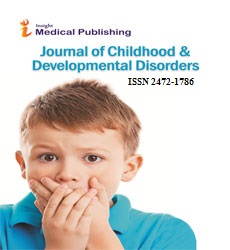Characteristics of Dyslexia and its effect on the Childhood
Yuko Hakamata
Yuko Hakamata*
Department of Clinical Psychology, International University of Health and Welfare, Japan.
- *Corresponding Author:
Received: October 01, 2021; Accepted: October 18, 2021; Published: October 22, 2021
Citation: Hakamata Y (2021) Characteristics of Dyslexia and its effect on the Childhood. J Child Develop Dis Vol.7 No.9: e005
Dyslexia is a specific learning disorder in which people have trouble reading because they have trouble recognizing speech sounds and learning how they relate to letters and words (decoding). Dyslexia affects the regions of the brain that process language and is sometimes referred to as reading trouble.
Dyslexia is a condition that tends to run in families. It appears to be linked to specific genes that influence how the brain interprets reading and language, as well as environmental risk factors. Premature birth or low birth weight
Nicotine, drugs, alcohol, or virus exposure during pregnancy may affect the fetus's brain development.
Individual distinctions in the areas of the brain that allow you to read
Dyslexia cannot be diagnosed with a single test. There seem to be a lot of things to think about, such as:
Life at home. A description of your family and home life, including who lives at home and whether there are any problems, may be requested by the doctor.
Questionnaires. Your child, family members, or instructors may be asked to answer written questions by the doctor. It's possible that your child will be requested to take exams to determine his or her reading and language ability.
Vision, hearing, and brain tests are all available (neurological). These can help determine whether Psychological testing is necessary or not. To have a better understanding of your kid's mental health, the doctor may ask you and your child questions. This might help you figure out if your child's abilities are being hampered by social issues, anxiety, or despair.
Reading and other academic skills are put to the test. A series of educational tests may be required for your child. and have the method and quality of his or her reading skills evaluated by a reading specialist.
Dyslexia is treated with a range of educational approaches and strategies, and the sooner it is addressed, the better. Psychological assessment will assist your child's teachers in developing an appropriate educational programme for your child.
Children who do not receive assistance until later in school may have a harder time learning the skills required to read successfully. They'll most likely fall behind academically and may never make up. Although a child having severe dyslexia will never be able to read easily, he or she can master reading skills and build techniques to improve school performance and quality of life.
Schools in the United States are required by law to assist students diagnosed with dyslexia with their learning difficulties. Request a meeting with your child's teacher to develop a structured, written plan that details your child's needs and how the school will assist him or her in succeeding. An Individualized Education Plan (IEP) is the term for something like this (IEP).
Teachers use different hearing, visual, and touch strategies to help students improve their reading skills. Helping a youngster learn using many senses — for example, listening to a recording lesson and identifying the shape of the letters used and the words spoken — can aid in information processing.
Adults with dyslexia may find it challenging to succeed in the workplace
Regardless of your age, get examination and instructional aid with reading and writing.
Under the Americans with Disabilities Act, ask your employer or academic institution about further training and appropriate accommodations.
Open Access Journals
- Aquaculture & Veterinary Science
- Chemistry & Chemical Sciences
- Clinical Sciences
- Engineering
- General Science
- Genetics & Molecular Biology
- Health Care & Nursing
- Immunology & Microbiology
- Materials Science
- Mathematics & Physics
- Medical Sciences
- Neurology & Psychiatry
- Oncology & Cancer Science
- Pharmaceutical Sciences
